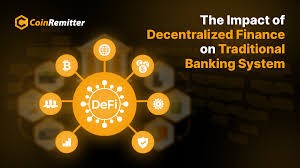Introduction
Impact on Banking Decentralized Finance (DeFi) has emerged as a revolutionary movement in the financial sector, disrupting traditional banking systems by offering permissionless and transparent financial services powered by blockchain technology. DeFi eliminates intermediaries such as banks and financial institutions, enabling users to trade, borrow, lend, and earn interest in a decentralized manner. In this blog, we explore the fundamentals of DeFi, its advantages, challenges, and the impact it has on traditional banking.
What is DeFi?
DeFi refers to a set of financial applications built on blockchain networks that operate without central authorities. Unlike traditional financial systems, DeFi platforms are powered by smart contracts, allowing users to access financial services in a trustless and decentralized environment.
Key Features of DeFi:
- Decentralization: Eliminates the need for banks and other intermediaries.
- Smart Contracts: Self-executing agreements that automate financial transactions.
- Transparency: All transactions are recorded on a public blockchain, ensuring security and trust.
- Open Access: Anyone with an internet connection and a crypto wallet can participate.
- Interoperability: DeFi applications can integrate with other blockchain-based protocols.
The Advantages of DeFi

1. Financial Inclusion
DeFi provides access to financial services for the unbanked and underbanked populations worldwide. Users can borrow, lend, and invest without needing a traditional bank account.
2. Lower Costs and Faster Transactions
By eliminating intermediaries, DeFi platforms reduce transaction costs and improve efficiency. Transactions settle quickly, avoiding the delays associated with traditional banking.
3. Enhanced Security and Transparency
DeFi applications leverage blockchain technology to ensure security and transparency. Users can verify transactions on a public ledger, reducing fraud and corruption risks.
4. Passive Income Opportunities
Users can earn interest on their digital assets by participating in liquidity pools, staking, and yield farming, generating passive income without relying on traditional financial institutions.
Challenges of DeFi

1. Regulatory Uncertainty
Governments and financial regulators are still developing policies to address the rise of DeFi. Unclear regulations create legal risks for users and developers.
2. Smart Contract Vulnerabilities
While smart contracts automate transactions, they are susceptible to bugs and hacking attempts. Exploits can lead to significant financial losses.
3. Scalability Issues
Some blockchain networks struggle with high transaction volumes, leading to congestion and high gas fees, particularly on networks like Ethereum.
4. Lack of Consumer Protection
Unlike traditional banks, DeFi platforms do not offer customer support or insurance, making it essential for users to exercise caution and conduct thorough research.
The Impact of DeFi on Traditional Banking
Disrupting the Lending and Borrowing Industry
DeFi platforms provide peer-to-peer lending services without requiring credit checks, offering competitive interest rates compared to traditional banks.
Challenging Cross-Border Transactions
Traditional banking systems charge high fees and take days to process international transfers. DeFi allows instant and cost-effective cross-border transactions, reducing reliance on banks.
Reducing Dependency on Banks
As DeFi adoption grows, more individuals and businesses may opt for decentralized solutions, reducing the need for traditional banking services.
Incentivizing Banking Innovations
To stay competitive, traditional banks may integrate blockchain technology and develop hybrid financial models that combine the best of both centralized and decentralized finance.
Conclusion
DeFi is transforming the financial landscape by providing accessible, cost-effective, and transparent financial services. While it presents challenges such as regulatory uncertainty and security risks, its potential to reshape banking cannot be ignored. As the DeFi ecosystem evolves, both users and financial institutions must adapt to this new era of decentralized finance.
Are you ready to explore the world of DeFi? Stay informed and make educated decisions as this disruptive technology continues to revolutionize global finance.
